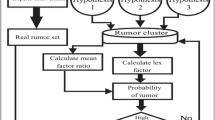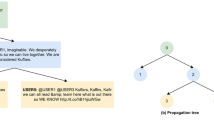Abstract
Social media is one of the largest sources of propagating information; however, it is also a home ground for rumors and misinformation. The recent extraordinary event in 2019, the COVID-19 global pandemic, has spurred a web of misinformation due to its sudden rise and global widespread. False rumors can be very dangerous; therefore, there is a need to tackle the problem of detecting and mitigating false rumors. In this paper, we propose a framework to automatically detect rumor on the individual and network level. We analyzed a large dataset to evaluate different machine learning models. We discovered how all our methods used contributed positively to the precision score but at the expense of higher runtime. The results contributed greatly to the classification of individual tweets as the dataset for the classification task was updated continuously, thereby increasing the number of training examples hourly.
Access this chapter
Tax calculation will be finalised at checkout
Purchases are for personal use only
Similar content being viewed by others
References
W. H. Organization et al.:Coronavirus disease 2019 (covid-19): situation report, 103 (2020)
Zarocostas, J.: How to fight an infodemic. The Lancet 395, 676 (2020)
Anderson, J., Rainie, L.: The Future of Truth and Misinformation Online, vol. 19. Pew Research Center (2017)
Latif, S., Usman, M., Manzoor, S., Iqbal, W., Qadir, J., Tyson, G., Castro, I., Razi, A., Boulos, M.N.K., Weller, A., et al.: Leveraging data science to combat covid-19: a comprehensive review (2020)
Tasnim, S., Hossain, M.M., Mazumder, H.: Impact of rumors or misinformation on coronavirus disease (covid-19) in social media (2020)
Hossain, M.S., Muhammad, G., Alamri, A.: Smart healthcare monitoring: a voice pathology detection paradigm for smart cities. Multimedia Syst. 25(5), 565–575 (2019)
Perrin, C.: Climate feedback accredited by the international fact-checking network at poynter. Clim. Feedback 24 (2017)
Kouzy, R., Abi Jaoude, J., Kraitem, A., El Alam, M. B., Karam, B., Adib, E., Zarka, J.. Traboulsi, C., Akl, E.W., Baddour, K.: Coronavirus goes viral: quantifying the covid-19 misinformation epidemic on twitter. Cureus 12 (2020)
Li, Q., Zhang, Q., Si, L., Liu, Y.: Rumor detection on social media: Datasets, methods and opportunities. arXiv preprint arXiv:1911.07199 (2019)
Shahi, G.K., Dirkson, A., Majchrzak, T.A.: An exploratory study of covid-19 misinformation on twitter. arXiv preprint arXiv:2005.05710 (2020)
Ahmed, H., Traore, I., Saad, S.: Detection of online fake news using n-gram analysis and machine learning techniques. In: International Conference on Intelligent, Secure, and Dependable Systems in Distributed and Cloud Environments. Springer, Berlin, pp. 127–138 (2017)
Bharadwaj, A., Ashar, B.: Source based fake news classification using machine learning. Int. J. Innov. Res. Sci. Eng. Technol. 2320–6710 (2020)
Zhao, Z., Resnick, P., Mei, Q.: Enquiring minds: early detection of rumors in social media from enquiry posts. In: Proceedings of the 24th International Conference on World Wide Web, pp. 1395–1405 (2015)
Liu, Y., Wu, Y.-F.B.: Early detection of fake news on social media through propagation path classification with recurrent and convolutional networks. In: Thirty-second AAAI conference on artificial intelligence (2018)
Qazvinian, V., Rosengren, E., Radev, D., Mei, Q.: Rumor has it: identifying misinformation in microblogs. In: Proceedings of the 2011 Conference on Empirical 15 Methods in Natural Language Processing, pp. 1589–1599 (2011)
Al-Rakhami, M.S., Al-Amri, A.M.: Lies kill, facts save: detecting covid-19 misinformation in twitter. IEEE Access 8, 155961–155970 (2020)
Jin, Z., Cao, J., Zhang, Y., Zhou, J., Tian, Q.: Novel visual and statistical image features for microblogs news verification. IEEE Trans. Multimedia 19, 598–608 (2016)
Gupta, A., Lamba, H., Kumaraguru, P., Joshi, A.: Faking sandy: characterizing and identifying fake images on twitter during hurricane sandy. In: Proceedings of the 22nd International Conference on World Wide Web, pp. 729–736 (2013)
Liu, X., Nourbakhsh, A., Li, Q., Fang, R., Shah, S.: Real-time rumor debunking on twitter. In: Proceedings of the 24th ACM International on Conference on Information and Knowledge Management, pp. 1867–1870 (2015)
Chua, A.Y., Banerjee, S.: Linguistic predictors of rumor veracity on the internet. In: Proceedings of the International MultiConference of Engineers and Computer Scientists, vol. 1, p. 387 (2016)
Wang, Y., Ma, F., Jin, Z., Yuan, Y., Xun, G., Jha, K., Su, L., Gao, J.: Eann: event adversarial neural networks for multi-modal fake news detection. In: Proceedings of the 24th acm sigkdd International Conference on Knowledge Discovery & Data Mining (2018), pp. 849–857
Wu, K., Yang, S., Zhu, K.Q.: False rumors detection on sina weibo by propagation structures. In: 2015 IEEE 31st International Conference on Data Engineering (IEEE, 2015), pp. 651–662
Hassan, N., Arslan, F., Li, C., Tremayne, M.: Toward automated fact-checking: detecting check-worthy factual claims by claimbuster. In: Proceedings of the 23rd ACM SIGKDD International Conference on Knowledge Discovery and Data Mining (2017), pp. 1803–1812
Liu, X., Li, Q., Nourbakhsh, A., Fang, R., Thomas, M., Anderson, K., Kociuba, R., Vedder, M., Pomerville, S., Wudali, R., et al.: Reuters tracer: a large scale system of detecting & verifying real-time news events from twitter. In: Proceedings of the 25th ACM International on Conference on Information and Knowledge Management (2016), pp. 207–216
DiFonzo, N., Bordia, P.: Rumor Psychology: Social and Organizational Approaches. American Psychological Association (2007)
Bugge, J.: Rumour has it: a practice guide to working with rumours. Communicating with Disaster Affected Communities (CDAC) (2017)
Vosoughi, S.: Automatic detection and verification of rumors on twitter. Ph.D. thesis, Massachusetts Institute of Technology (2015)
Wu, W., Li, B., Chen, L., Gao, J., Zhang, C.: A review for weighted minhash algorithms. IEEE Trans. Knowl. Data Eng. (2020)
Amerini, I., Ballan, L., Caldelli, R., Del Bimbo, A., Serra, G.: A sift-based forensic method for copy–move attack detection and transformation recovery. IEEE Trans. Inf. Forensics Secur. 6, 1099–1110 (2011)
Acknowledgements
Special thanks go out to the African Institute for Mathematical Sciences (AIMS) and LIMSAD for their support toward this paper.
Author information
Authors and Affiliations
Corresponding author
Editor information
Editors and Affiliations
Rights and permissions
Copyright information
© 2022 The Author(s), under exclusive license to Springer Nature Singapore Pte Ltd.
About this paper
Cite this paper
Bamiro, B., Assayad, I. (2022). Data-Based Automatic Covid-19 Rumors Detection in Social Networks. In: Ben Ahmed, M., Teodorescu, HN.L., Mazri, T., Subashini, P., Boudhir, A.A. (eds) Networking, Intelligent Systems and Security. Smart Innovation, Systems and Technologies, vol 237. Springer, Singapore. https://doi.org/10.1007/978-981-16-3637-0_57
Download citation
DOI: https://doi.org/10.1007/978-981-16-3637-0_57
Published:
Publisher Name: Springer, Singapore
Print ISBN: 978-981-16-3636-3
Online ISBN: 978-981-16-3637-0
eBook Packages: Intelligent Technologies and RoboticsIntelligent Technologies and Robotics (R0)




